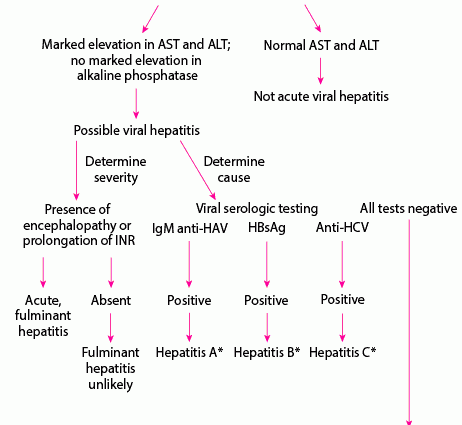Contents
What is acute hepatitis
Acute hepatitis is an inflammation of the liver, which leads to a sharp tissue damage and rather pronounced manifestations. There are a lot of reasons for the development of this pathology, but the main ones are viruses and a toxin.
In addition to acute, there is a chronic form of hepatitis. Their difference is in the duration of inflammation. Acute lasts less than 6 months, chronic – more than 6 months.
Causes of acute hepatitis in adults
Acute inflammation of the liver can be caused by many infectious and non-infectious causes, the most common of which are viral infection or drug-induced liver injury.
Infectious causes:
- hepatitis viruses (A, B, C, D, E);
- Epstein-Barr virus;
- cytomegalovirus;
- herpes simplex virus;
- Coxsackie virus;
- adenovirus
- dengue virus
- coronavirus (COVID-19)
- bacteria, fungi and parasites.
Causes associated with toxins or poisonous substances:
- alcohol;
- medications (paracetamol, antibiotics, anticonvulsants, statins, non-steroidal anti-inflammatory drugs, herbal and nutritional supplements);
- other toxic substances are mushroom poisons, carbon tetrachloride, sea anemone toxin (it enters the body as a result of a bite).
Immunological or inflammatory conditions:
- autoimmune hepatitis;
- biliary tract diseases such as primary biliary cholangitis or primary sclerosing cholangitis;
- pregnancy-related preeclampsia, acute fatty liver.
Ischemic and vascular damage:
- cardiogenic shock;
- hypotension;
- heatstroke.
Symptoms of acute hepatitis in adults
Patients with acute viral hepatitis usually have symptoms such as fever, malaise, fatigue, loss of appetite, vomiting, diarrhea, and abdominal pain. Patients may also report yellowish eyes or skin (jaundice), dark urine, and light-colored stools.
Depending on the underlying cause, physical examination findings may reveal signs of acute encephalopathy, seizures, bleeding diathesis, hypotension, and other manifestations associated with multiple organ failure.
Treatment of acute hepatitis in adults
Treatment for acute hepatitis depends on the specific factor that caused liver damage.
Diagnostics
To diagnose acute hepatitis, liver activity tests are done to determine how quickly the blood clots (because people with acute hepatitis do not clot normally). If acute viral hepatitis is most likely, the cause is determined if possible. To determine the cause, doctors usually do the following:
- find out if the patient is taking any drugs that can cause hepatitis (for example, a drug to treat tuberculosis) and how much alcohol they drink;
- Ask about activities that may increase the risk of contracting viral hepatitis
- do blood tests to determine which hepatitis virus is causing the infection
- sometimes, if the diagnosis is unclear, a liver biopsy is done.
Modern treatments
Hepatitis A and E are the most common infectious causes of acute hepatitis and usually have a favorable outcome – inflammation resolves within 2 to 4 weeks with supportive care, which includes intravenous fluids, antiemetics, and symptomatic treatment. At the same time, patients should avoid the use of alcohol and other drugs that are potentially harmful to the liver, as well as over-the-counter supplements.
Paracetamol overdose is a common non-infectious cause of acute hepatitis leading to acute liver failure and should be considered in all patients with signs and symptoms of acute liver failure. Treatment in this case is the intake of acetylcysteine. Treatment with acetylcysteine is also recommended in all patients with acute liver failure, with the exception of ischemic hepatitis.
The treatment prognosis for acute hepatitis depends on the cause causing direct liver damage. Timely identification of the causative agent and specific treatment are essential to reduce morbidity and mortality.
Prevention of acute hepatitis in adults at home
Hepatitis A and hepatitis B vaccines have significantly reduced the incidence of these infections.
The hepatitis A virus is transmitted by fecal-oral transmission, so good food preparation, water treatment, and hygiene will reduce the risk of spreading the infection.
The risk of contracting hepatitis B and hepatitis C can be reduced by practicing safer sex.
Popular questions and answers
We asked a series of questions about acute liver injury and hepatitis gastroenterologist Marat Zinnatullin.










